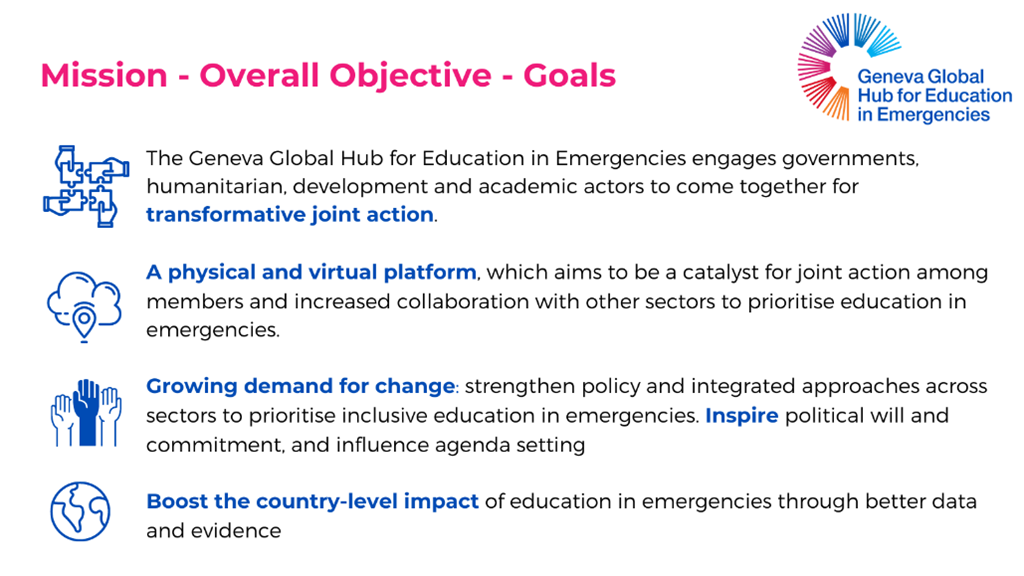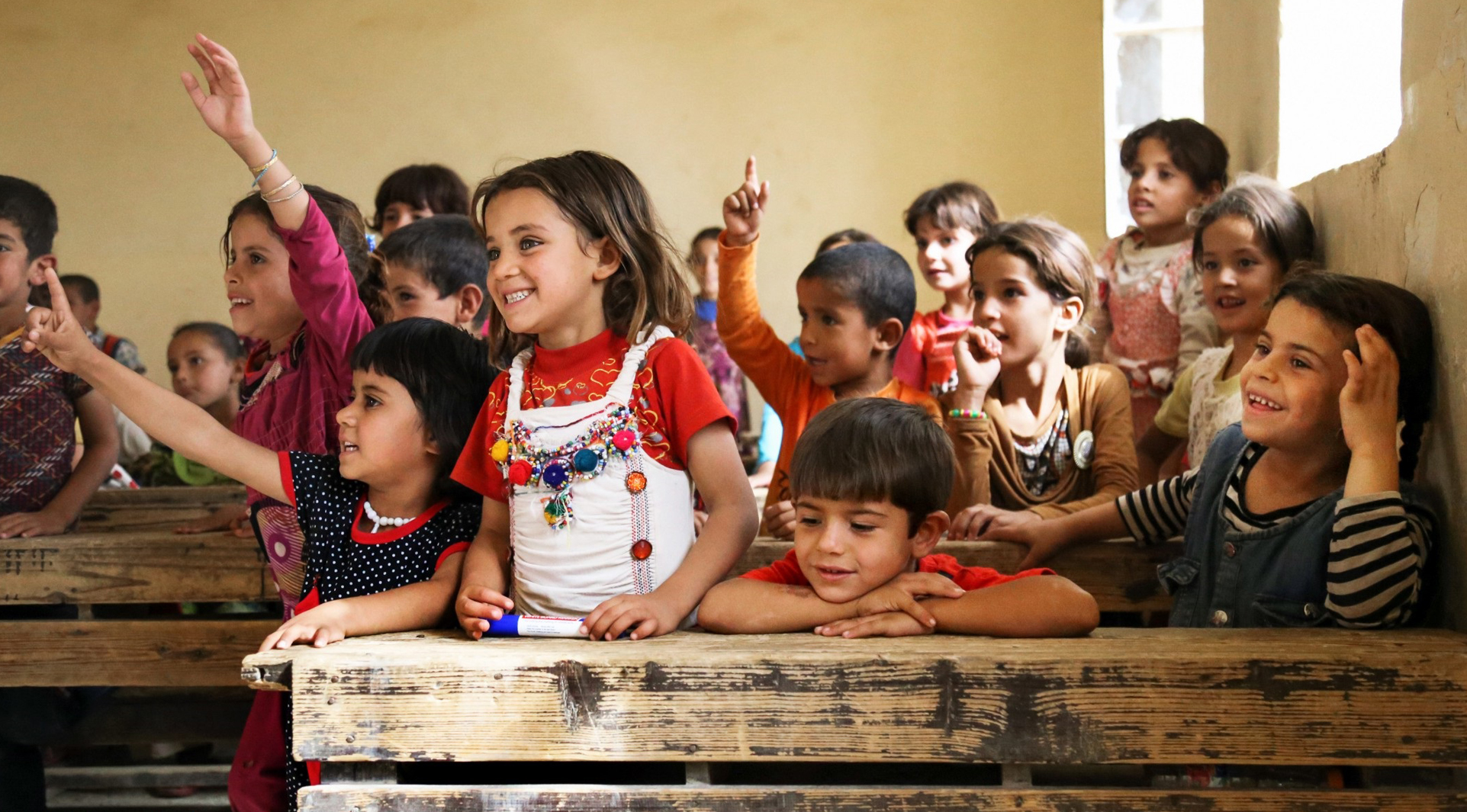Event Highlights - NORRAG Supports Launch of Geneva Global Hub for Education in Emergencies
On 25 January 2021, NORRAG and the Graduate Institute for International and Development Studies supported the launch of the Geneva Global Hub for Education in Emergencies. The online event took place from 13:00-14:30 CET and welcomed over 450 attendees. Those not registered for the event were given the opportunity to view a livestream of the event on the Geneva Global Hub for Education in Emergencies Facebook page.
Watch the event recording in English and International Sign. Recording in Arabic, French, Portuguese and Spanish will be uploaded shortly.
Opening remarks were made by Ambassador Jürg Lauber, Permanent Representative of Switzerland to the United Nations and the other international organisations in Geneva. He presented a harrowing statistic: 127 million children in the world are out of school because they are displaced and/or trapped in crises brought on by pandemics, conflicts, and natural disasters. For those affected by crises, education is not just an opportunity to develop new knowledge and skills for the future; it is a lifeline which brings hope, protection, and a sense of stability. Ambassador Lauber reiterated Switzerland’s commitment to providing education to children in emergencies, following a pledge made at the first World Refugee Forum (2019). As Geneva is the world’s humanitarian capital, hosting a rich tapestry of academic, non-governmental, and private sector organisations, the Hub aims to create synergies across sectors to make joint action a reality.
During the event, an emphasis was placed on including voices from children and practitioners, especially through this video, “Voices from the Field,” which highlighted the need and urgency for prioritising education in emergencies:
The following panel discussion, moderated by Yasmine Sherif, Director at Education Cannot Wait, invited seven guest panelists, including representatives from the Hub’s partner agencies.
- Stefania Giannini, Assistant Director-General for Education at UNESCO, believes the Hub will be an important platform to advocate for more funding for education in emergencies. UNESCO is ready to assist with statistics, planning, and policy responses.
- Helen Durham, Director of Law and Policy at the International Committee of the Red Cross and Red Crescent Societies (ICRC), stated that in the past few years, the organisation has incorporated education-related needs into their protection response strategies in 30 operational contexts. The Hub will benefit from ICRC’s multi-disciplinary approach to conflict.
- Hina Shikhani, an Afghan refugee born in Pakistan, notices discrimination toward refugees in university admissions. She also stated psycho-social issues hinder the ability for displaced children and youth to remain in school. She sees the Hub as a way to facilitate the necessary cooperation of all sectors in providing education and fostering inclusion.
- Fadi Yarak, Director General at the Ministry of Education and Higher Education in Lebanon, spoke of the difficulties in access to education for learners in Lebanon, whether Lebanese or non-Lebanese refugees. Inequalities have been exacerbated by the COVID-19 pandemic and violence in the region. The Hub can provide a comprehensive approach and help to increase financial support.
- Giancarlo De Picciotto, Head of International Cooperation at the Swiss Agency for Development and Cooperation in Mali, brought our attention to the disturbing reality that combatants can attack and disrupt schools, and threaten teachers and students. He stressed the intersectionality of issues surrounding education, such as: protection, health, and food security. He hopes the Hub can encourage political investment in education to address these intersectoral challenges.
- Dean Brooks, Director of the Inter-agency Network for Education in Emergencies (INEE), plans to amplify the voices of those affected by crises through his organisation’s 18,000 members. Community-building and knowledge management are their key contributions to the Hub.
The issues that local actors and partners raise will influence the overall objectives, goals, and actions of the Hub:

Maria Agnese Giordano, Coordinator of the Global Education Cluster underlined their role in overcoming the silos by facilitating greater collaboration. The EiE Hub Coordinator, Petra Heusser, moderated a brief Q & A afterwards, addressing questions related to the Hub’s contribution to SDG4. Closing remarks were given by Meritxell Relaño, Deputy Director of UNICEF’s Office of Emergency Programmes. She summarized by re-stating the importance of engaging with children and youth themselves; placing an emphasis on strong leadership; and developing new ways to reach children left behind in emergencies.
The founding partners of the Geneva Global Hub for Education in Emergencies include Education Cannot Wait, Global Education Cluster, Graduate Institute of International and Development Studies, ICRC, The Inter-agency Network for Education in Emergencies (INEE), the Swiss Federal Department of Foreign Affairs, UNHCR, UNICEF, UNESCO and the Université de Genève. Organisations interested in joining the Hub can find the membership criteria and the application process here, more information is available by contacting Gabriella Miranda: admiranda@unicef.org.
Watch the event recording in English and International Sign. Recording in Arabic, Spanish, French and Portuguese will be uploaded shortly.
Download the programme in العربية, English, Español, Français & Português.
Picture credits: UNICEF/Iraq2015/Anmar

